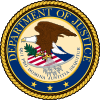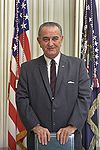- Nicholas Katzenbach
-
Nicholas Katzenbach 
65th United States Attorney General In office
January 28, 1965 – September 30, 1966
Acting Attorney General from September 4, 1964 - January 28, 1965President Lyndon B. Johnson Preceded by Robert F. Kennedy Succeeded by Ramsey Clark 24th Under Secretary of State In office
October 3, 1966 – January 20, 1969President Lyndon B. Johnson Preceded by George W. Ball Succeeded by Elliot Richardson 5th United States Deputy Attorney General In office
1962–1965President John F. Kennedy
Lyndon B. JohnsonPreceded by Byron White Succeeded by Ramsey Clark Personal details Born January 17, 1922
Philadelphia, PennsylvaniaPolitical party Democratic Spouse(s) Lydia King Phelps Stokes Alma mater Princeton University
Yale Law SchoolProfession Lawyer Military service Service/branch United States Army Air Forces Unit Eighth Air Force Battles/wars World War II Nicholas deBelleville Katzenbach (born January 17, 1922) is an American lawyer who served as United States Attorney General during the Lyndon B. Johnson administration.
Contents
Early life
Katzenbach was born in Philadelphia, Pennsylvania and raised in Trenton, New Jersey. His parents were Edward L. Katzenbach, who served as Attorney General of New Jersey, and Marie Hilson Katzenbach, who was the first female president of the New Jersey State Board of Education. His uncle, Frank S. Katzenbach, served as mayor of Trenton and as a Justice of the New Jersey Supreme Court. He was named after his mother's great-great-grandfather, Nicholas de Belleville (1753–1831), a French physician who accompanied Kazimierz Pułaski to America and settled in Trenton in 1778.[1][2]
Katzenbach served in the United States Army Air Corps in World War II. Assigned as a navigator in the 381st Bomb Squadron, 310th Bomb Group in North Africa. His B-25 Mitchell Bomber was shot down February 23, 1943 over the Mediterranean Sea off North Africa . He spent over two years as a prisoner of war in Italian and German POW camps.[3]
Katzenbach attended Phillips Exeter Academy, received his B.A. cum laude from Princeton University in 1945 and his LL.B. cum laude from Yale Law School in 1947, where he served as Articles Editor of the Yale Law Journal. From 1947 to 1949, he was a Rhodes Scholar at Balliol College, Oxford.
On June 8, 1946, Katzenbach married Lydia King Phelps Stokes, in a ceremony officiated by her uncle, Anson Phelps Stokes, former canon of the Washington National Cathedral. Her father was Harold Phelps Stokes, a newspaper correspondent and secretary to Herbert Hoover.[4]
Katzenbach was admitted to the New Jersey bar in 1950 and the Connecticut bar in 1955. He was an associate in the law firm of Katzenbach, Gildea and Rudner in 1950.
Government service
From 1950 to 1952 he was attorney-advisor in the Office of General Counsel to the Secretary of the Air Force. Katzenbach was on the faculty of Rutgers School of Law—Newark from 1950 to 1951; was an associate professor of law at Yale from 1952 to 1956; and was a professor of law at the University of Chicago from 1956 to 1960.
He served in the U.S. Department of Justice as Assistant Attorney General of the Office of Legal Counsel in 1961-1962 and as Deputy Attorney General from 1962 to 1965. President Johnson appointed Katzenbach the 65th Attorney General of the United States on February 11, 1965, and he held the office until October 2, 1966. He then served as Under Secretary of State from 1966 to 1969.
In September 2008, Katzenbach published Some of It Was Fun: Working with RFK and LBJ (W. W. Norton), a memoir of his years in Government service.
The "Stand in the Schoolhouse Door"
Main article: Stand in the Schoolhouse Door Alabama Governor George Wallace (in front of door) standing defiantly against desegregation while being confronted by Deputy U.S. Attorney General Nicholas Katzenbach (standing opposite Wallace) at the University of Alabama.
Alabama Governor George Wallace (in front of door) standing defiantly against desegregation while being confronted by Deputy U.S. Attorney General Nicholas Katzenbach (standing opposite Wallace) at the University of Alabama.
On June 11, 1963, Katzenbach was a primary participant in one of the most famous incidents of the Civil Rights struggle. Alabama Governor George Wallace stood in front of Foster Auditorium at the University of Alabama in an attempt to stop desegregation of that institution by the enrollment of two black students, Vivian Malone and James Hood. This became known as the "Stand in the Schoolhouse Door." Wallace stood aside only after being confronted by Katzenbach, accompanied by federal marshals and the Alabama National Guard.
Role in JFK assassination investigation
A 1979 account of the House Select Committee on Assassinations (HSCA), reported that on November 25, 1963, only 3 days after the John F. Kennedy assassination and before any formal federal investigation had been conducted, Nicholas Katzenbach, then deputy attorney general, had written a memo to presidential assistant Bill Moyers at the White House. Katzenbach's memo comes the closest of any known official document (Katzenbach's memo) to discussing a government coverup:
- "The public must be satisfied that Oswald was the assassin; that he had no confederates who are still at large; and that evidence was such that he would have been convicted at trial...Speculation about Oswald's motivation ought to be cut off...Unfortunately the facts on Oswald seem about too pat—too obvious (Marxist, Cuba, Russian wife, etc.)...We need something to head off public speculation or Congressional hearings of the wrong sort."
The Committee's final report implies Katzenbach, FBI Director J. Edgar Hoover, and others were the key actors behind the creation of the Warren Commission. According to the report, Hoover told staff members on November 24, 1963 that he and Katzenbach were anxious to have "something issued so we can convince the public that Oswald is the real assassin," though the idea of a commission was initially opposed by President Johnson.
Later years
Katzenbach left government service to work for IBM in 1969, where he served as general counsel during the lengthy antitrust case filed filed by the Department of Justice seeking the break-up of IBM. He and Cravath's top lawyer Thomas Barr led the case for 13 years until the government dropped it in 1982. Later Katzenbach led the case filed by the European Economic Community. He retired from IBM in 1986 and became a partner at the firm of Riker, Danzig, Scherer, Hyland & Perretti in New Jersey.[5] He was named chairman of the failing Bank of Credit and Commerce International (BCCI) in 1991.[6]
In 1980, Nicholas Katzenbach testified in the United States District Court for the District of Columbia for the defense of W. Mark Felt, later revealed to be the "Deep Throat" of the Watergate scandal and later Deputy Director of the FBI; accused and later found guilty of ordering illegal wiretaps on American citizens.
In December 1996, Katzenbach was one of New Jersey's fifteen members of the Electoral College, who cast their votes for the Clinton/Gore ticket.[7]
Mr. Katzenbach also testified on behalf of President Clinton on December 8, 1998, before the House Judiciary Committee hearing, considering whether to impeach President Clinton.[8]
On March 16, 2004, MCI Communications in a press release announced "its Board of Directors has elected former U.S. Attorney General Nicholas Katzenbach as non-executive Chairman of the Board, effective upon MCI's emergence from Chapter 11 protection. Katzenbach has been an MCI Board member since July 2002." MCI later merged with Verizon.
Katzenbach and his wife Lydia reside in Princeton, New Jersey, with a summer home on Martha's Vineyard in West Tisbury, Massachusetts.[9] His son is writer John Katzenbach. His daughter Maria Katzenbach is also a published novelist.
See also
- Video: Nicholas Katzenbach talks about his youth (bigthink.com)
- Video: Nicholas Katzenbach on RFK and LBJ (bigthink.com)
- Video: Nicholas Katzenbach compares Vietnam and Iraq (bigthink.com)
- Some of It Was Fun - publisher web site
- The Best and the Brightest
References
- ^ Lineage Book, National Society of the Daughters of the American Revolution, Volume XXXV (1901).
- ^ "Trenton Old & New", Trenton Historical Society. Accessed June 27, 2008.
- ^ http://tpmcafe.talkingpointsmemo.com/2009/01/26/respect_for_law_and_the_constitution_is_also_good/index.php#comment-3351824 Letter from Katzenbach at TPM Cafe 2009
- ^ "Nuptials are Held for Lydia Stokes", The New York Times, June 9, 1947. Accessed June 27, 2008.
- ^ Riker Danzig firm history
- ^ See Katzenbach, Nicholas (de Belleville) in John S. Bowman, ed., The Cambridge Dictionary of American Biography (Cambridge, England: The Cambridge University Press, 1995).
- ^ 1996 Electoral College Votes, accessed December 21, 2006
- ^ transcript
- ^ "Land Bank adds beach, pasture", Martha's Vineyard Times, March 29, 2007. Accessed June 28, 2008.
External links
Legal offices Preceded by
Robert Kramer (lawyer)United States Assistant Attorney General
for the Office of Legal Counsel
1961–1962Succeeded by
Norbert A. SchleiPreceded by
Byron WhiteUnited States Deputy Attorney General
Served under: John F. Kennedy, Lyndon B. Johnson
1962–1965Succeeded by
W. Ramsey ClarkPreceded by
Robert F. KennedyUnited States Attorney General
Served under: Lyndon B. Johnson
1965–1966Succeeded by
W. Ramsey ClarkPolitical offices Preceded by
George Wildman BallUnder Secretary of State
1966–1969Succeeded by
Elliot RichardsonUnited States Attorneys General Randolph • Bradford • Lee • Lincoln • Breckinridge • Rodney • Pinkney • Rush • Wirt • Berrien • Taney • Butler • Grundy • Gilpin • Crittenden • Legaré • Nelson • Mason • Clifford • Toucey • Johnson • Crittenden • Cushing • Black • Stanton • Bates • Speed • Stanbery • Evarts • Hoar • Akerman • Williams • Pierrepont • Taft • Devens • MacVeagh • Brewster • Garland • Miller • Olney • Harmon • McKenna • Griggs • Knox • Moody • Bonaparte • Wickersham • McReynolds • Gregory • Palmer • Daugherty • Stone • Sargent • W D Mitchell • Cummings • Murphy • Jackson • Biddle • T C Clark • McGrath • McGranery • Brownell • Rogers • Kennedy • Katzenbach • W R Clark • J N Mitchell • Kleindienst • Richardson • Saxbe • Levi • Bell • Civiletti • Smith • Meese • Thornburgh • Barr • Reno • Ashcroft • Gonzales • Mukasey • Holder
Cabinet of President Lyndon B. Johnson (1963–1969) Vice President 
Secretary of State Secretary of the Treasury Secretary of Defense Attorney General Postmaster General Secretary of the Interior Secretary of the Agriculture Secretary of Commerce Luther H. Hodges (1963–1965) · John T. Connor (1965–1967) · Alexander Buel Trowbridge (1967–1968) · C. R. Smith (1968–1969)Secretary of Labor Secretary of Health, Education and Welfare Anthony J. Celebrezze (1963–1965) · John William Gardner (1965–1968) · Wilbur Joseph Cohen (1968–1969)Secretary of Housing and Urban Development Secretary of Transportation United States Under Secretaries of State Frank Polk • Norman H. Davis • Henry P. Fletcher • William Phillips • Joseph Grew • Robert E. Olds • J. Reuben Clark • Joseph P. Cotton • William R. Castle, Jr. • William Phillips • Sumner Welles • Edward Stettinius, Jr. • Joseph Grew • Dean Acheson • Robert A. Lovett • James E. Webb • David K. E. Bruce • Walter Bedell Smith • Herbert Hoover, Jr. • Christian Herter • C. Douglas Dillon • Chester Bowles • George Ball • Nicholas Katzenbach • Elliot Richardson • John N. Irwin II Categories:
Categories:- 1922 births
- Living people
- People from Philadelphia, Pennsylvania
- United States Attorneys General
- United States Assistant Attorneys General
- United States Deputy Attorneys General
- Under Secretaries of State (United States)
- American chief executives
- American Episcopalians
- People associated with the John F. Kennedy assassination
- American Rhodes scholars
- Phillips Exeter Academy alumni
- Princeton University alumni
- Yale Law School alumni
- 1996 United States presidential electors
- People from Trenton, New Jersey
- Rutgers School of Law–Newark faculty
- Yale Law School faculty
- University of Chicago faculty
- American prisoners of war
- American military personnel of World War II
- New Jersey Democrats
- Lyndon B. Johnson Administration cabinet members
- United States Army Air Forces officers
Wikimedia Foundation. 2010.
